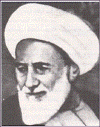Muhammad Salih al-`Uthaymin, Ibn Baz's long-time Second Fiddle and his rightful heir and successor in strange and unusual rulings.
He made the following statements in his Fatawa:
1- "No human being seeks a means through something except he believes that it possesses effectiveness towards the end he desires."1 He made this statement in order to enable himself to declare those who make tawassul, apostate.
2- "We must not call the Messenger of Allah Habîbullâh ("the Beloved of Allah") but only Khalîlullâh ("the Intimate Friend of Allah").
3- "Can the vision of Allah Most High in the hereafter be other than in a direction?"2
4- "We should not ask the Prophet to ask forgiveness for us because the deeds of a human being end the moment he dies and he cannot even ask forgiveness for himself."
Shaykh Mamduh called this statement "impudent" and "a blunder" and refuted it in Raf` al-Minara (p. 81-86).
Like the rest of his sect, `Uthaymin is an anthropomorphist who asserts "two eyes" for the Most High and Exalted in his commentary on Ibn Taymiyya's al-Wasitiyya, whereas none of the Salaf went beyond asserting "the eye" and "the eyes" without adding "two" into the letter of the Qur'an and the hadith,
and Ibn Hazm remarked, "To say that He has two eyes is null and void and part of the belief of anthropomorphists."
In his commentary on Ibn Taymiyya's `Aqida Wasitiyya, `Uthaymin commits tamthîl - making up similes - by comparing Allah Most High to the sun, stating that "Allah is in the heaven in person (bi dhâtihi) but despite this He draws near to the servant during the latter's prayer, just as the sun is in the heaven, while its rays reach creatures on earth."
This unprecedented innovation was examined at length elsewhere.3
`Uthaymin echoed the claim of Ibn Taymiyya and Ibn `Abd al-Wahhab that Imam al-Busayri's (d. 694) verse masterpiece in praise of the Prophet titled Qasidat al-Burda "contains passages that constitute shirk."4
Wahhabis have leveled the same crass accusation against Imam al-Jazuli's (d. 870) Dala'il al-Khayrat and have succeeded in banning both books from entering Saudi Arabia. Not only none of the Imams of Ahl al-Sunna ever condemned Qasidat al-Burda for "containing passages that constitute shirk," but it was obligatory reading and part of the syllabus taught by Ibn Hajar as well as both his students, al-Suyuti and al-Sakhawi.5
He also states of the sayings of Allah Most High {Wait they for naught else than that Allah should come unto them in the shadows of the clouds with the angels?} (2:210) and {Your Lord shall arrive with angels, rank on rank} (89:22): "To explain these verses as a reference to the coming or arrival of the order of Allah is unsound because it contravenes the literal meaning (zâhir al-lafz) of the verse and the Consensus of the Salaf, and there is no proof for it."
Dr. Ahmad Hijazi al-Saqqa said: "Shaykh Muhammad ibn Salih al-`Uthaymin says in his explanation of Ibn Taymiyya's `Aqida Wasitiyya (Cairo: Maktabat al-`Ilm ed. p. 23) that 'the coming' is not explained as 'the coming of the order,' rather it is explained as a coming which befits the majesty of Allah without anthropomorphic imagery nor suggestion of modality (min ghayri tashbîh wa la takyîf). That is, he is establishing that there is a body that moves by coming and by returning (ay annahu yuthbitu jisman yataharraku bi al-majî'i wa al-rujû`), however, he does not declare corporeality explicitly (la yusarrihu bi al-jismiyya). And this is the 'Salafi' school."6
`Uthaymin's statement above mostly shows typical concealment of the actual Consensus of the Salaf and the proofs of the Sharî`a.
It is authentically narrated from the Tâbi`în Abu al-`Aliya (d. 90) and al-Rabi` (d. 139) that they said of the first verse: "It means the angels come in the clouds"7 as confirmed by al-Bayhaqi.8 The grammarian al-Akhfash (d. 210) said that {that Allah should come} (2:210) is not understood literally concerning Allah, but means that His order (amr) should come.9
Imam Ahmad likewise interpreted {that Allah should come} (2:210) to mean that His order (amr) should come, in the light of His saying: {Await they aught save that the angels should come unto them or thy Lord's command should come to pass?} (16:33).10
He further interpreted {Your Lord shall arrive} (89:22) to mean His reward (thawâb) should come.11
The grammarian al-Zajjaj (d. ~310) said: "
It means the promised reckoning and punishment shall come to them in the form of a cloud, as in His saying: {Allah visited them fromwhere they did not expect} (59:2), that is: by abasing them."12
The above reports suffice to refute the shameless lie of a supposed consensus of the Salaf whereby they did not interpret the coming of Allah Most High as His order.
In this simple line he has
(a) violated the Salaf's rule of bilâ kayf - "not saying how" - that applies to the verses pertaining to the Divine Attributes and Attributes of Acts;
(b) attributed an act that is precluded, prohibited, and close to shirk to apply to the Transcendent Creator of the worlds, namely, "sitting";
(c) made use of an innovated phrase which the pious Sunni Salaf never used, namely, "in person" (bidhâtih);
(d) applied that innovated phrase to the Deity Most High whereas any attribute pertaining to Allah is by, Consensus, ordained and non-inferable (tawqîfî);
(e) generally promoted the doctrine of anthropomorphism, which is not Islamic but comes straight out of the abrogated Books.
Al-Shahrastani said: "Pure, unmitigated anthropomorphism was found among the Jews - not all of them, but only their literate people of learning, for they found in the Torah many expressions that suggested it."14 Al-Shahrastani also related that Ibn Karram said: "Allah is firmly seated on the throne and He is with His very Essence (dhâtan) on its upper side."
>> More on Shaykh Gibril's site

No comments:
Post a Comment